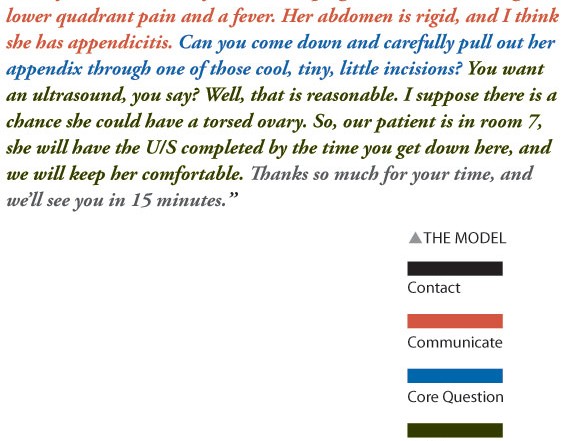What makes a successful consult call? New research has resulted in “The 5 Cs”: Contact, communicate, core question, collaborate and close the loop.
What makes a successful consult call? New research has resulted in “The 5 Cs”: Contact, communicate, core question, collaborate and close the loop.
CONSULT, v.i. To seek another’s disapproval of a course already decided on.
Ambrose Bierce, The Devil’s Dictionary, 1881
When did you learn how to call a consult? Think hard. Was it in medical school? Residency? Maybe it was as a junior attending. I’ll be honest; I do not think I ever formally learned. I just watched others do it, used my intuition and picked up the phone. Listening to a good consult is kind of like recognizing that patient that is about to crash; you don’t know why or how, but you just know. And just as sure as that patient is going to crump as soon as you walk into the room, a bad consultation will leave you feeling dark and lonely for the rest of your shift.
I don’t think it has to be like this. What if we did the unthinkable? What if we taught medical students and residents how to call a consult? It wouldn’t take much; a very simple, standardized format for calling our colleagues. We could meet their expectations, they could meet ours. We would all be on the same page. And just maybe we could actually communicate like adults instead of throwing temper tantrums like my 2 year old at Gymboree. Sounds pretty good in theory, no? Well, we did it. We call it the 5 Cs of consulting.
I started talking about this very real problem to colleagues about three years ago. I gave a few lectures locally, got some great feedback and took the show on the road. Then I started digging into the medical literature about consultation. Didn’t find much. So, I dug a bit deeper into other disciplines’ literature like business, aviation, nuclear power and the military. I found a whole lot more.

Then I thought to myself, we can do better than this. So I took the next logical step; I asked EPs and specialists, “What are the most important aspects of a consult?” Think back to a successful consultation. What was it like? What did you do well? What did the consultant do well? We described what people told us—We broke all the “data” down into categories or themes. These same categories helped develop the 5 Cs Model: contact, communicate, core question, collaborate and close the loop. It might look something like the color-coded model above.
The kind folks at the Journal of Emergency Medicine liked the model so much, they decided to publish it in June of this year.1
It’s really as simple as that. A few Cs to standardize and hopefully improve something we do every day. A recent article suggests that we call a consult on somewhere between 20 and 40% of all admitted patients we see and treat in the ED.2 Some might argue this is one of our biggest tools, one of our biggest assets. So, the next question begs, “so what?” Can standardizing the consultative process actually improve patient care? Will it not only lead to more effective communication, but also better patient outcomes?
I, for one, am a believer, so we decided to take this to the streets. Two groups of emergency medicine residents were randomized to either 5 Cs training or standard consultation training. Following the didactic and interactive educational sessions, each resident made a call to a standardized consultant, based on staged cases. Those calls were recorded and analyzed. Three raters used a checklist to score the calls and another three independent raters used a global rating scale. In the end, those that got the 5 Cs training did better…much better.3 However, as noted in the study, despite improved communication, we still did not assess patient outcome data. This remains to be studied. Hopefully, this is a call to arms for some research that is not based on performing one-finger CPR on lab rats. What we have done, hopefully, is stir up the pot. We are studying these same 5 Cs in the medical student population, beginning to look at the taxonomy of consultations and have a pilot project in the works assessing the feasibility of collecting clinical outcome measures in the ED related to consultation. I am excited to see where this goes.
References:
1. Kessler, CS, Kutka, BM, Badillo, C. Consultation in the emergency department. A qualitative analysis and review. J. Emerg. Med. Epub. June 7,2011 pp 1-8.
2. Lee RS, Woods R, Bullard M, et al. Consultations in the emergency department: a systematic review of the literature. Emerg Med J. 2008; 25:4-9.
3. Kessler, et al. A prospective, randomized controlled study demonstrating a novel, effective model of transfer of care between physicians: The 5Cs of Consultation. Under Review.




1 Comment
Thank you so much for laying out this helpful framework. How would you assess patient outcomes with this?